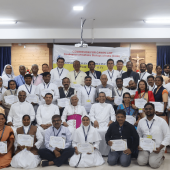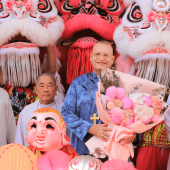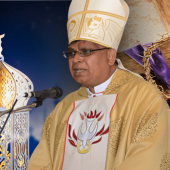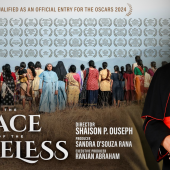India: Western Region Migrant Commission Charts Practical Roadmap for Ministry

The Western Region Migrant Commission of India convened a two-day meeting in Mumbai on Sept. 18–19, bringing together 20 members under the leadership of Bishop Bernard Lancy Pinto of Aurangabad, Chairman of the Commission, and Fr. Glasten Gonsalves, Regional Secretary.
Secretaries from 10 dioceses participated, engaging in deliberations on how to strengthen the Commission’s structures and initiatives to more effectively serve migrants in their dioceses and throughout the region.
In his inaugural message, Archbishop John Rodrigues of the Archdiocese of Bombay reflected on Pope Leo’s vision for the Church and society. He underlined that the struggles and journeys of migrants are not just challenges to be endured but powerful witnesses of faith and resilience. Their ability to keep hope alive amidst uncertainty, he said, makes them living missionaries of hope for the world today.
Bishop Lancy Pinto highlighted the complex challenges migrants face, particularly the ill effects of development policies such as displacement, coastal development projects, and land acquisition for industrial corridors. “It is often the industrialists who govern, not the government,” he remarked, calling for the creation of a legal cell to safeguard migrants’ rights. He further emphasized the need to study migration patterns over the past two decades and prepare for the likely rise in poverty and displacement.
Participants agreed on the urgent need for awareness among bishops, clergy, and religious, recognizing the complexity of migration and its pastoral implications. Fr. Manuel D’Silva noted that “migrants are a blessing for our dioceses because of the vitality and contributions they bring.”
Sr. Rani Punnasseril, representing the CCBI Commission for Migrants, addressed the gathering on the purpose and mission of the Commission, affirming that migration is a pastoral priority of the Church in India.
The sessions also included a presentation by Mr. Rajendra Bhise of YUVA, who spoke powerfully on migration, employment, and exploitation, highlighting the precarious working conditions migrants often endure. He underlined the critical importance of documentation and identity rights, stressing that access to proper IDs is essential for migrants to secure employment, social services, and legal protections. His inputs provided practical insights into linking grassroots realities with policy advocacy.
The sessions and group discussions focused on coordination among diocesan secretaries and religious congregations, establishing documentation centers for migrants, creating help desks in parishes, and providing pastoral care in migrants’ languages. Participants also stressed the importance of networking and collaboration to respond effectively to emergencies and safeguard vulnerable communities.
In his concluding remarks, Bishop Lancy presented a practical roadmap for action. He urged dioceses to develop migrant databases and provide introduction letters for those moving to new dioceses, ensuring smoother integration and continuity of care. He further called for a shared resource bank of trained personnel and best practices, alongside quarterly regional meetings to review progress and address urgent cases. At the same time, he encouraged dioceses to set both short-term and long-term goals, balancing immediate needs with sustainable strategies.
The meeting closed with a renewed spirit of unity and determination. Participants affirmed that networking, documentation, and advocacy are not optional but urgent priorities for the Church’s mission. Above all, they recognized that migrants are not problems to be solved but people to be embraced, true bearers of hope for the Church and society.
Radio Veritas Asia (RVA), a media platform of the Catholic Church, aims to share Christ. RVA started in 1969 as a continental Catholic radio station to serve Asian countries in their respective local language, thus earning the tag “the Voice of Asian Christianity.” Responding to the emerging context, RVA embraced media platforms to connect with the global Asian audience via its 21 language websites and various social media platforms.














